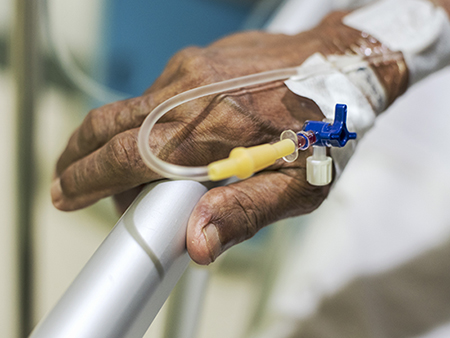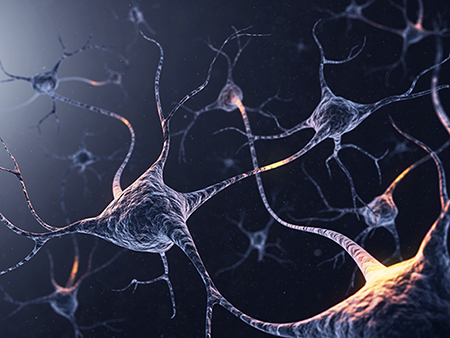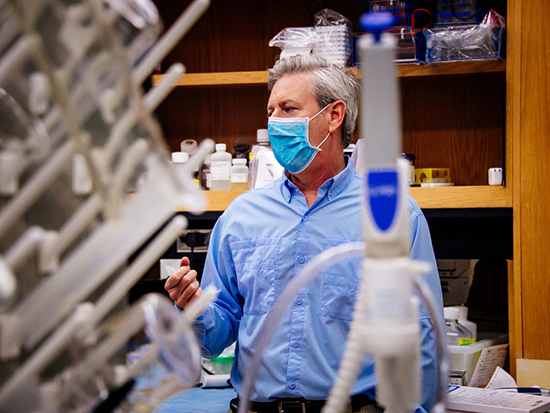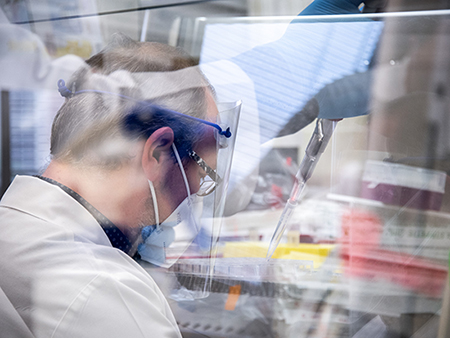By: Christina Crowe
Published Date: Dec 22
Editor’s note: This year was untraditional in many ways including the way we celebrate people who leave the department in retirement. While we didn’t have a traditional party, we continue to celebrate one of our longtime employees, Kathy Coleman. The following was written by Yabing Chen, Ph.D., Jay M. McDonald Endowed Professor in Laboratory Medicine and Vice Chair, Faculty Development and Education.
Kathy Coleman received her bachelors’ degree in Business Management from University of Alabama at Tuscaloosa. She joined UAB Department of Pathology in 2003 as an Office Associate I in the Division of Molecular & Cellular Pathology. She has since worked in different areas of the Department, including the Chair’s office, and moved up in the ranks to Office Associate II and Administrative Associate. During her 17-year tenure at UAB, Kathy has provided excellent administrative support to many faculty members in the department.
I have been very fortunate to work closely with Kathy since starting my role as Vice Chair for Faculty Development and Education in January 2017. Kathy’s wealth of knowledge about departmental administration and different UAB and HSF financial and administrative systems facilitates my role in assisting our faculty and trainees with their professional development and education needs. With her help, we updated the Department of Pathology promotion and tenure guidelines, generated manuals to standardize departmental faculty mentoring, evaluation, and promotion process. Kathy is very organized and takes the initiative to follow up with faculty and trainees on their requests. She always takes pride in getting her job done at its best.
Kathy’s dedication has made the transition of the MCP pathology seminar to the centralized departmental Grand Rounds smooth. For all departmental Grand Rounds and Named Lectures, Kathy became the face of UAB Department of Pathology to contact and provide administrative support to the invited speakers from all over the country and international institutes. I have heard so many compliments about her professionalism and warm hospitality.
Kathy is a very kind person. Her nice demeanor is infectious and affects everyone she has worked with. I enjoyed working with Kathy, as her kind personality spills over reflecting in her positive attitude towards the job. She understands the importance of her role to facilitate the process and improve work efficiency. We have encountered many difficulties over the years, but Kathy would always work with me to find a solution. Her kindness, commitment and professionalism are also witnessed by many faculty in our department (see below). I am extremely grateful toKathy for all her help, and congratulate her for her well-deserved retirement.
Read more
 The 72-year-old patient was unable to mount her own immune defense against the SARS-CoV-2 virus because of chronic lymphocytic leukemia, which compromises normal immunity and immunoglobulin producA 72-year-old woman was hospitalized with severe COVID-19 disease, 33 days after the onset of symptoms. She was suffering a prolonged deteriorating illness, with severe pneumonia and a high risk of death, and she was unable to mount her own immune defense against the SARS-CoV-2 virus because of chronic lymphocytic leukemia, which compromises normal immunoglobulin production.
The 72-year-old patient was unable to mount her own immune defense against the SARS-CoV-2 virus because of chronic lymphocytic leukemia, which compromises normal immunity and immunoglobulin producA 72-year-old woman was hospitalized with severe COVID-19 disease, 33 days after the onset of symptoms. She was suffering a prolonged deteriorating illness, with severe pneumonia and a high risk of death, and she was unable to mount her own immune defense against the SARS-CoV-2 virus because of chronic lymphocytic leukemia, which compromises normal immunoglobulin production. 






 Lalita Samant, Ph.D.,
Lalita Samant, Ph.D.,  Selvarangan Ponnazhagan, Ph.D.
Selvarangan Ponnazhagan, Ph.D.

 Shi Wei, M.D., Ph.D., Professor, Associate Director, Anatomic Pathology, was recently elected, on October 26, as a 2020-2022 Uncontested Executive Committee Member-at-Large for the
Shi Wei, M.D., Ph.D., Professor, Associate Director, Anatomic Pathology, was recently elected, on October 26, as a 2020-2022 Uncontested Executive Committee Member-at-Large for the  Anthony Fauci, M.D., one of the lead members of the White House Coronavirus Task Force focusing on the COVID-19 pandemic in the United States, and Kathleen Neuzil, M.D., one of the world’s most influential research scientists and advocates in vaccine development and policy, delivered keynote addresses to more than 2,000 trainees, faculty, staff and invited guests today as part of the
Anthony Fauci, M.D., one of the lead members of the White House Coronavirus Task Force focusing on the COVID-19 pandemic in the United States, and Kathleen Neuzil, M.D., one of the world’s most influential research scientists and advocates in vaccine development and policy, delivered keynote addresses to more than 2,000 trainees, faculty, staff and invited guests today as part of the